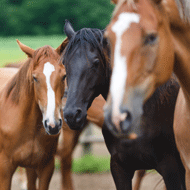First Colic Awareness Week launches

“Colic is still a huge welfare concern for horse owners due to the suddenness with which it can appear and the potential consequences that it can cause."
The British Horse Society and the University of Nottingham are holding the first ever Colic Awareness Week (1-7 April).
Research at the university’s School of Veterinary Medicine and Science found that 90 per cent of horse owners did not feel confident spotting the early signs of colic.
The awareness week, which forms part of the REACT Now to Beat Colic Campaign, aims to raise awareness of the subtle early signs of the condition, to ensure veterinary treatment can be sought quickly.
Nottingham’s research also found that up to one in three cases of colic seen by vets as out of hours emergencies were critical. Out of these cases, more than 80 per cent of horses were euthanised or died.
Since the REACT Now campaign launched, BHA have distributed nearly 30,000 colic packs and nearly 15,000 guides to horse owners and carers.
Emmeline Hannelly, BHS welfare education manager said: “Colic is still a huge welfare concern for horse owners due to the suddenness with which it can appear and the potential consequences that it can cause.
“I think that dedicating a whole week to raising awareness of the issues associated with the condition will help to provide owners with the information they need to make informed decisions about their horse’s welfare.”
Throughout the week, BHS and Nottingham vet school will be providing owners with top tips and videos on how to prevent colic. Veterinary practices that are part of the Vet REACT Colic Champions Scheme will also be sharing information with their clients.
Visit the BHS website for more information.



 The RCVS has announced a new version of its 1CPD mobile app, with enhanced features for veterinary surgeons and veterinary nurses to record their continuing professional development.
The RCVS has announced a new version of its 1CPD mobile app, with enhanced features for veterinary surgeons and veterinary nurses to record their continuing professional development.